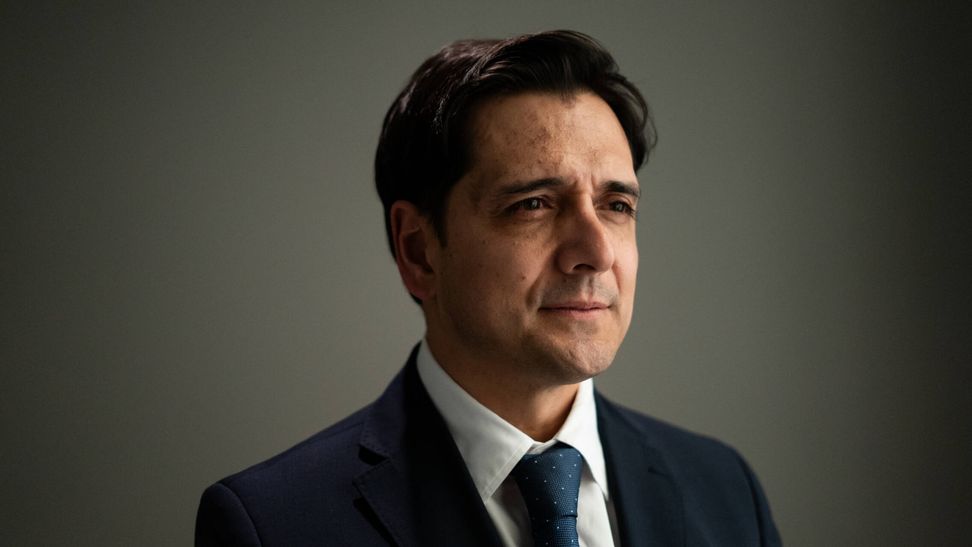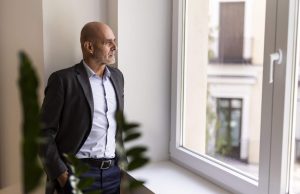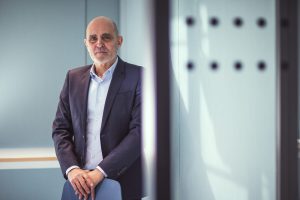Fundación Grupo Social has been operating in Colombia for a century. It was created by a Spanish priest to attend to the needs of the poorest. Since then, it has built up an emporium that maintains its founding objectives.
It is not the parable of the talents, but it is very similar. As is well known, the parable teaches us that the gifts the Lord bestows on his subjects must be given to the bankers in order for them to bear fruit. Some 113 years ago, the Spanish Jesuit priest, José María Campoamor, fulfilled the mandate, described in the Gospel of Saint Matthew, and the result today is Fundación Grupo Social. The Foundation is one of the first financial institutions in Colombia, and it has not lost its founding ideology. Its Chairman, Juan Carlos Gómez Villegas, recently visited the Madrid head office of CECA, the association of savings banks and banks created by such banks, such as Caixabank, Unicaja and Ibercaja, itself a member of the World Savings and Retail Banking Institute (WSBI), chaired by Isidro Fainé. This international association is the world's largest retail banking association and offers financial services mainly to SMEs and households. WSBI member entities have assets totalling $13.25 trillion, employ 2.1 million workers and serve 1.4 billion customers in 69 countries, with a network of more than 200,000 branches.
QUESTION. How is it possible that an institution like yours is still in operation more than a century later?
REPLY. The organisation was created by Father José María Campoamor, highly influenced by what he saw in the Catholic Workers' Circles in Europe and in savings banks. From the outset, he saw that encouraging productive activity was key to the development of the less advantaged. The first thing he did when he founded the Workers‘ Circle of San Francisco Javier was to create the savings section of the Workers’ Circle, which is Banco Caja Social. The Foundation operates in society in two ways, one by working directly with communities and the other by working with businesses. Companies do not simply finance the work of the foundation, but are an integrated, essential part of the foundation's Obra Social. This has worked for 113 years because it has been able to consolidate a solid governance system, because the Foundation, like all foundations, has no owner.
Q. Someone must be in charge?
A. We have two boards, in addition to three governing bodies. The three bodies are the Social Board, made up of seven people of the highest calibre, completely independent of the organisation's management, and a Governing Board, which is the body that I would say acts as the organisation's board of directors, also composed of seven people who are completely independent of what happens in the organisation's management. Finally, we have the chair of the Foundation, which is the body that executes the policies that are implemented. They operate with a system of checks and balances between them. One is a technical authority and the other is more of an axiological authority, one of guidance. This did not always exist, but it has gradually consolidated its position and today we have a robust and mature system that has allowed us to achieve what we have.
'The Foundation has believed that companies must necessarily have an impact on society and fulfil a social function'
Q. Which has more weight, the finance division or the strictly business division, in terms of the day-to-day management of the companies?
R. The foundation is both an NGO and the parent company of a corporate group. The companies exist because the Foundation created them to pursue its goals. The goal is to contribute to overcoming the structural causes of poverty in order to build a just, supportive, productive and peaceful society. That is our purpose in the organisation. That is what the 9,300 of us who work there do every day. The financial sector has always been very important, since the days of Campoamor, because saving is the means by which a poor family can overcome its conditions of exclusion and poverty. But we also have a presence in other sectors, such as housing construction, and we are stepping into the tourism sector. We have also been very strong in the insurance sector since the time of Campoamor, with mutual insurance companies set up by the workers themselves. They are already active in death insurance, as they say in Spain, or in unemployment insurance. As well as providing retirement protection, even before a social security system was established in Colombia.
Q. How do you reconcile this pursuit of social interest with profitability and financial solvency?
A. That is a very good question. The Foundation's companies are not simply a source of funding, they are an integral part of its work. They are not an accident, they are intentionally selected and serve a social function. The Foundation has believed that companies must necessarily have an impact on society and fulfil a social function. The first is to solve genuine needs. Not just asking what I can sell, but what solution am I going to offer to a genuine problem that people have. And that means choosing sectors, the financial sector or the social protection sector. What we do is identify the base segment of the social pyramid. Low-income families and small productive units. Smaller businesses, including informal businesses. These are the activities of Banco Caja Social Colmena Seguros, which is another of the organisation's structural companies. Companies then focus on sectors or segments that others are either unwilling or unable to serve.
Q. As a bank supervised by the regulatory authorities, ensuring solvency cannot be easy.
A. It is not that it operates at a loss. Many people are confused about what non-profit organisations are. The party who should not profit is the owner or the founder or administrator of the entity.
 Gómez Villegas during an event at CECA, in Madrid. (A. B.)
Gómez Villegas during an event at CECA, in Madrid. (A. B.)Q. Are they profitable?
A. Our companies must be profitable. And then there is the second function of the companies. The first is to address needs. The second is to generate wealth, the maximum wealth for society, a fair amount of wealth for the owner. Not producing as much as a company can produce for society is something that is not negotiable. This is like the parable of the talents. Yes, the talents are there, they must be placed at the service of society. And an entrepreneur is somewhat the bearer, so to speak, of a few talents. Not doing so in the best possible and most productive way is not negotiable. The Foundation has asked itself what is a fair return on its capital investments and has identified a rate for each type of company in each sector, which it considers to be a fair rate of return and which is, of course, in line with the risks of the type of activity in which each company is engaged and which also takes into account a profit. And we have a calculated reserve rate. Not even our companies know what rate we expect. This is something that we manage in the Foundation and provides us with room for manoeuvre. If companies have more profitability in the medium and long term, we have more to distribute. Companies must generate as much wealth as possible for society as a whole and a fair amount for the owner. The third reason why the Foundation operates companies is to build a community of people. When one compares, for example, our companies with those in the sector, and I speak particularly of Banco Social as an example, while 80% of the Colombian financial system is focused on corporate banking, including state banking or high-income banking, I would say that 90% of Banco Social is focused on families earning between two and four minimum wages and the smallest productive units.
'The Foundation showed solidarity. By the third month, seeing that Covid would last for a long time, we said: 'whoever can pay should pay and we will waive 30%'
Q. How do you deal with crises, which always hit the poor harder than high income earners?
A. The pandemic is an example. Allow me to describe it with an example. In April 2020, a month after the start of the pandemic, we had very severe restrictions in our country. And then, naturally, our customers, who are at the bottom of the social pyramid, were locked up in their homes with no possibility of venturing out. Not even to earn enough to buy their groceries, to pay for services, let alone to pay the instalments on their loans. We asked ourselves, what are we going to do? And we remembered our slogan, the friendly bank. And what does a friend do? We told our customers: 'look after your health, take care of yourself: then we will talk'. We said the same to those who had loans with us. And what we did was to waive 50% of the interest on the monthly instalment for April. The Foundation showed solidarity with its customers. By the third month, seeing that this was going to last for a long time, we said: 'whoever can pay should pay and we will waive 30% of the interest of the instalment'. What happened was that a significant proportion of the bank's customers came forward to pay their loans.
Q. I am afraid that considering how strict the supervisory authorities are, this would be unthinkable in Spain or Europe.
A. Prudential regulations in Colombia are also very strict and this never put at risk, say, the solvency or liquidity of the bank and its capacity to assume all its obligations. At that time, the Financial Supervisory Office of Colombia, the banking authority, approved certain regulations to support debtors, which Banco Social, like all banks, embraced, and they were very positive, very positive. The 30% donation was within our limits and by that time customers had already begun to pay. But we saw that the vaccines were a long way off and many of our 600,000 customers were still having problems, so we asked ourselves again what could we do, but in more structural sense. And we discovered that by relieving our customers' cash flow for six months, many of them would pull through. We did the math and the Foundation, as owner of the bank, decided to pay, on behalf of all 600,000 customers, 25% of the instalments for half a year without asking for anything in return.
Q. Didn't the number of defaults rise?
A. We only demanded that customers meet their 75%. And that is what happened. This was a massive effort for the Foundation, costing $100 million. After those six months, customers returned to paying 100% of their instalments. Some 96% of the bank's customers resumed their regular repayments. The Foundation never collected a single peso of what it put up on behalf of its customers. That year, the bank was one of the least profitable in the entire Colombian financial system, with a ROE (return on equity) close to zero. But the following year it was back to normal. Today, it is a very profitable bank, one of the three or four most profitable in the system, and we lived up to our slogan: the friendly bank.
'The Foundation supports communities and people with fewer opportunities to become drivers of their own development'
Q. How is your relationship with the rest of the private financial sector? Although your model is not the same as that of the former savings banks, in Spain there were tensions between these and banks, who accused them of unfair competition.
A. There was a regulatory reform in 1990 that forced the savings banks of that era, which were two or three, to become banks, thus we no longer have savings banks, we have banks dedicated to the retail segment in Colombia. I would say that the Colombian financial sector is competitive. Our bank, Banco Social, is the best in our segment.
Q. I understand that your business model differs completely from the business model of cooperatives. In Spain, we have success stories.
A. In Colombia there is also one, but no, it is not a cooperative model. It is a bank operating as a shareholder-owned public limited liability company. The owner is Fundación Grupo Social. There are some entities that operate as a cooperative, but they are few in number.

Q. What is the economic situation in Colombia?
A. Without being an expert on the subject, we have a situation of high inflation, close to 9%, with interest rates still very high. The intervention rate is at 11.75, albeit with a downward curve. Today we are seeing that the economy is gradually starting to recover. But it is a complex situation. Companies have less appetite for debt at very high rates. Non-performing loans have increased. With this economic framework, private investment has slowed down.
Q. Has economic policy changed much under Gustavo Petro?
A. Yes, I would say that there is a set of reforms being proposed by the government that have generated a great deal of uncertainty for investors. However, economic policy in Colombia has so far remained, shall we say, firm, and has complied with fiscal regulation and shown a certain degree of prudence in public finances. This government is very prone to subsidies, etc. I would say that the economic variables, much more so than the economic public policies, those have not changed. There are announcements to the effect that they intend to seek some change in the model, but nothing of the sort has yet materialised. But there is one thing, and that is the uncertainty that investors have shown in the face of the reforms, but also in the face of the economic climate.
Q. Returning to Fundación Grupo Social, it's a kind of compassionate capitalism, in inverted commas.
R. Yes, it could be said that it is. Fundación Grupo Social believes in the enterprise-based economic system and entrepreneurial freedom. It deeply believes in this and its companies are designed to operate within it. To compete in a free market economy. The Foundation is not a typical foundation, it does not have a social welfare character. The Foundation does not hand out gifts, it does not assist, it does not subsidise. What the Foundation does is support communities and people with fewer opportunities so that they themselves become drivers of their own development. And it does this in all its dimensions, in the corporate sector and in the direct programmes that it has in the different territories throughout the country, but also with its partners in its holistic management. It is a place that helps people with fewer resources to get ahead and take control of their own destiny. It has that role of giving that little push and supporting communities. It is not necessary to provide the fish, but to teach how to fish. And I would say that the Foundation goes one step further, we fish together. Human dignity is very important.
'Companies must generate as much wealth as possible for society as a whole, while generating a fair amount for the owner'
Q. One could argue that the Foundation reaches those sectors of society that the welfare state cannot.
A. I would say yes, but the foundation cannot replace the State. The Foundation must be able to demand from the State what the State is mandated to do, both with regard to companies and in direct work programmes with communities.
Q. How do these communities function?
A. They are our progress-territories that are scattered all over the country. We have the non-tourist Cartagena, the one on the other side of the swamp, which is extremely poor and vulnerable. Neco, which is a municipality in Antioquia, on the Caribbean coast, also in Nariño. We have another small municipality, Tangua, and in Bogotá we have two projects in very excluded, marginalised places, and in Algeciras, which is in Huila, in the centre of the country. What we do is to select a particularly poor territory, and when we talk about poverty we are talking about monetary poverty and multidimensional poverty, about particular conditions of exclusion, but where the Foundation has the possibility of operating. If before our work was activity-based, now we work in the territory with all the people who live in that territory. Our staff tour the area and learn the ins and outs of what is going on there. This is a plan spanning years, many years. This not only concerns material issues, but also issues of community life, the environment, conflict resolution, and so on. When we arrive, we start measuring and then, from time to time, every two years, we measure what is happening in those territories to see if we are making the impact we want to make, because our commitment to those communities is to leave when those communities have started a journey. When we see that there is no turning back, we leave and settle somewhere else.













